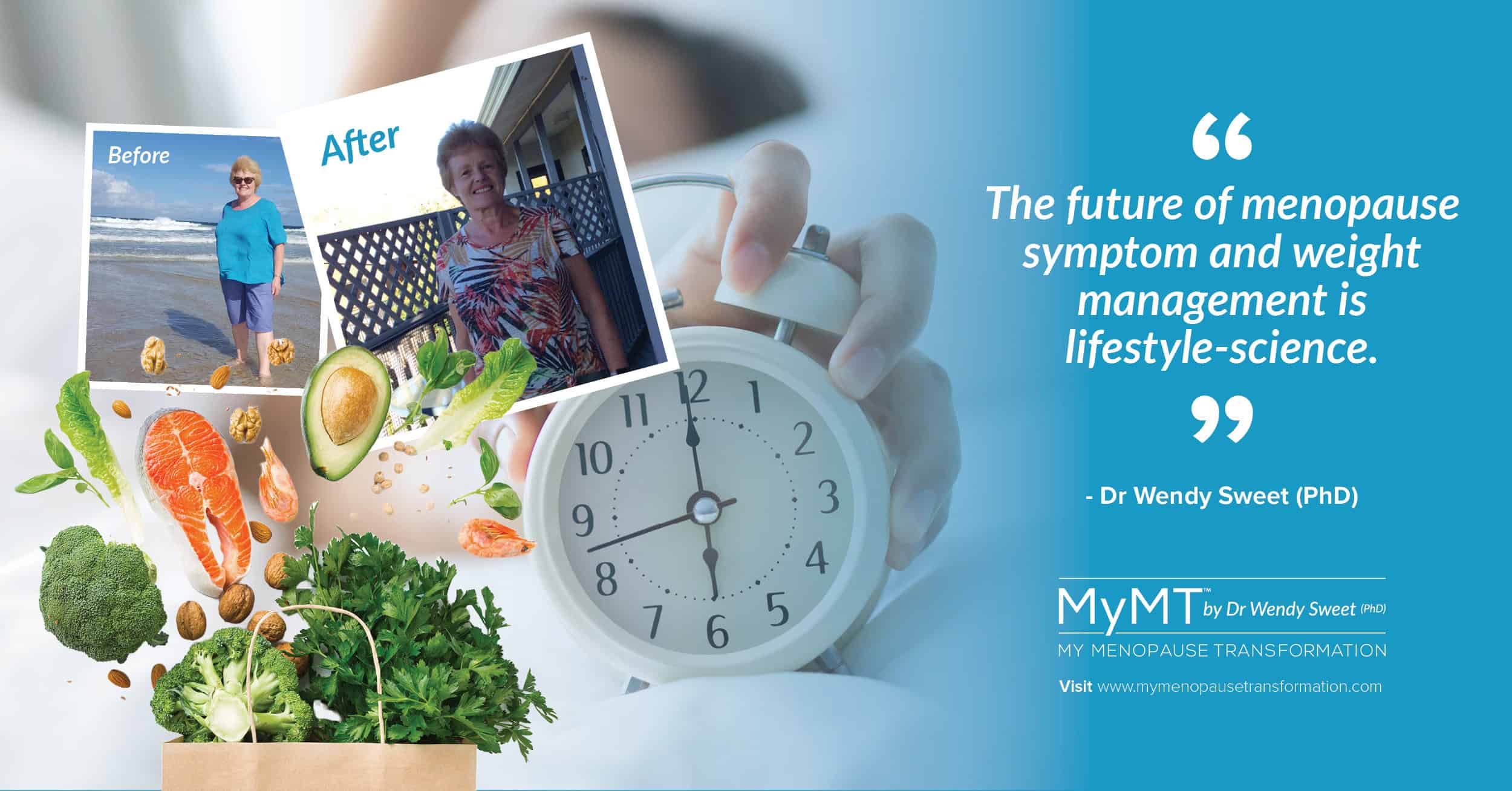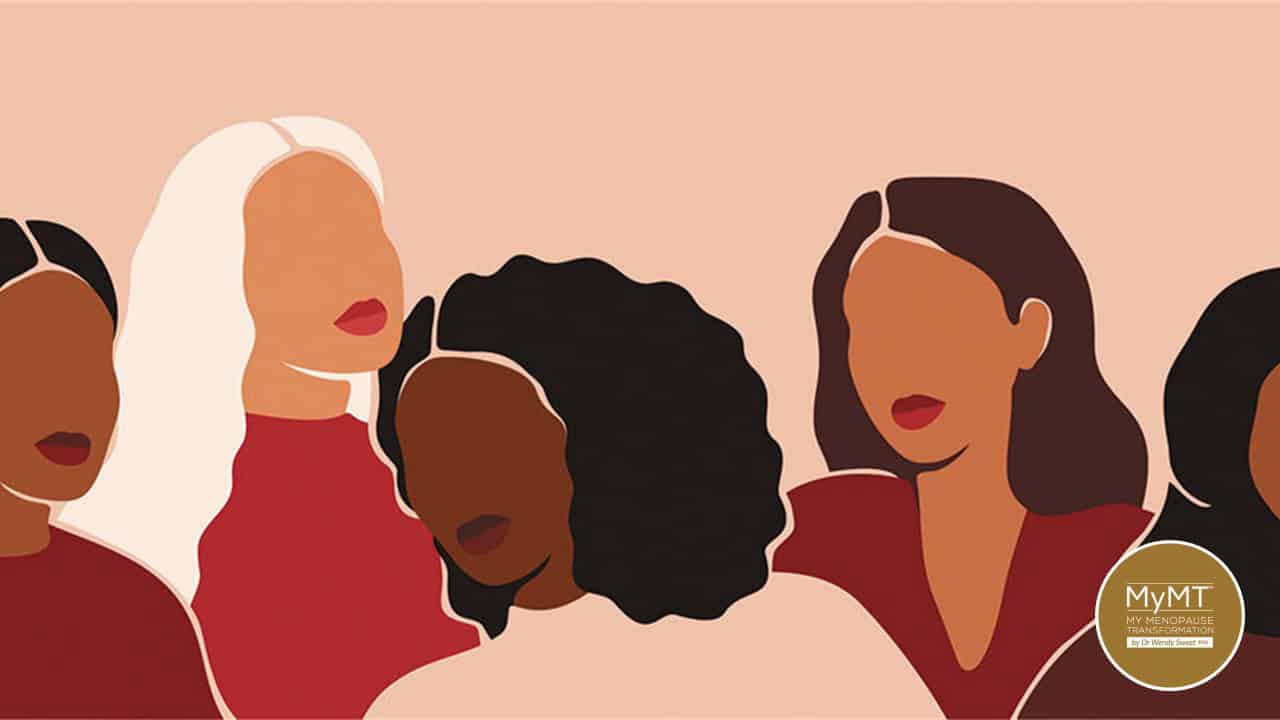With the possible exception of pilot whales, no mammals studied to date are known to commonly exhibit the cessation of their reproductive capacity as they get older. Except of course, for human females.
I didn’t know that. Did you?
It wasn’t until I read an intriguing article that I found out – ‘The evolutionary origin and significance of menopause.’ (Pollycove et al, 2011).
For those of you approaching mid-life (45-60 years), my theme this month has been about ‘New Beginnings’. That’s why i want to share this article with you. As I discovered myself when I reached my early 50s, I realised I didn’t understand what menopause was. Nor did I fully understand that there were three distinct stages to this transition from our reproductive years towards our non-reproductive years. These three stages are:
Peri-menopause: this is when our oestrogen production begins to decline as we lose ovarian receptors for oestrogen. In most women begins around 45 yrs, but interestingly, in the Hadza tribal women, the average age is 42 yrs.
You still get your periods, but they may fluctuate from light to heavy, or even disappear and re-appear, which depends on numerous factors including stress, over-exercising, weight gain or other health concerns.
Menopause: This is when your periods cease. The average age globally is 51-52 years.
Post-Menopause: When your periods have ceased for a year, you now enter post-menopause. Welcome to your biological ageing years!
I hope that sharing this article with you might help you to make sense of your symptoms as you navigate this life-stage, which, for millions of women around the world, throws them into some emotional and physical chaos. It was the same for myself as well.
Some women will have severe symptoms right from peri-menopause to post-menopause – sometimes lasting for 10 or more years.
But here’s the thing. Menopause is relatively unique to us as a species. And 100 years ago, it might not have been a problem, simply because we didn’t live very long. With 1 billion women projected to be in menopause by 2025, the world is facing a situation without precedent – we are living longer in post-menopause than ever before.
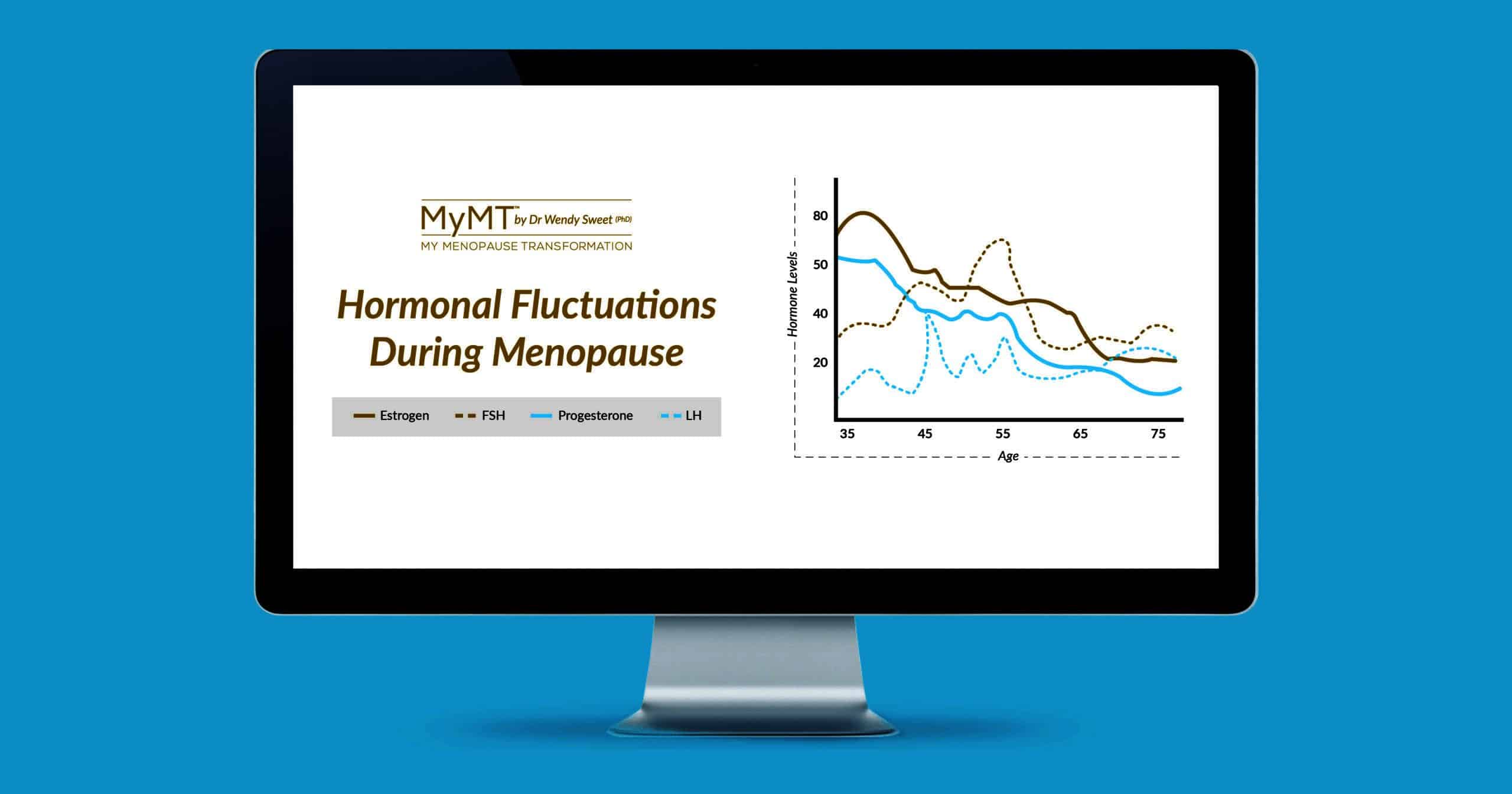
Menopause heralds in our biological ageing. From a physiological perspective, we are finishing our reproductive capability and in natural menopause (as opposed to surgical menopause), our ovaries are going into decline. As such, we reduce substantially our ability to make oestrogen.
In most western countries, the average age of menopause begins around our mid-40’s (called peri-menopause) and ends when we haven’t had a period for a year or more (called post-menopause). In many societies, women reach post-menopause around their mid-50’s.
Several theories have been proposed to explain why menopause might have evolved and efforts to understand this biological event have engaged anthropologists and evolutionary biologists for decades. Many of these theories are based on aspects of the human life history whereby menopause is seen not as a disease, but as a survival advantage.
A doctoral thesis by Swedish researcher, Fanny Hägg, explains,
“Menopause, the cessation of female reproduction well before death, is a puzzling phenomenon, because evolutionary theory suggests there should be no selection for survival when reproduction has ended. The evolution of menopause is a complex issue, containing many factors, kinship dynamics among the most important. Theories apply unequally to various species and populations, meaning an integrated approach is necessary for decrypting the evolution of menopause. (Hagg, 2020).
Understanding what menopause represents to us as a species is important – especially if we are going to make any sense of our symptoms. Numerous theories abound, and one of these theories is known as the Adaptive Theory.
This theory is also known as the ‘Grandmother Hypothesis‘ and is the most acknowledged. It views ovarian failure and menopause in older human females as favouring survival of their daughters in order to help them raise and survive additional offspring.
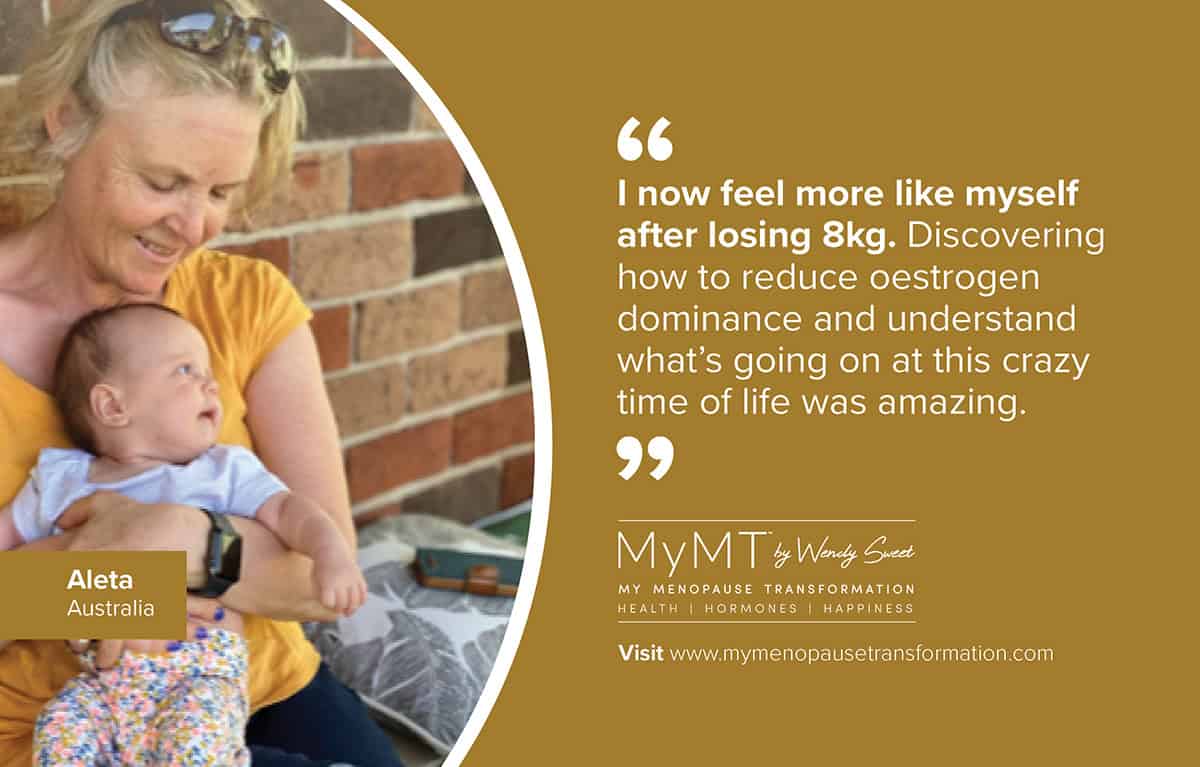
Anthropologists believe that because human babies are incapable of moving around on their own soon after being born, and human babies need to be fed and nourished, then menopause has become a survival adaptation.
Post-reproductive grandmothers who don’t reproduce any more themselves, can therefore, assist their adult daughters. That’s why this theory is also known as the ‘Grandmother Theory’.
In the grandmother hypothesis, females can gain benefits from stopping reproduction long before they die by helping to care for their existing children (or grandchildren) instead of producing more, which helps their descendants to survive.
‘Natural selection would favour females who become infertile many years before death if offspring require exceptional duration and intensity of parental care, as is the case with humans’ suggests the authors (Pollycove et al. 2011, p. 2).
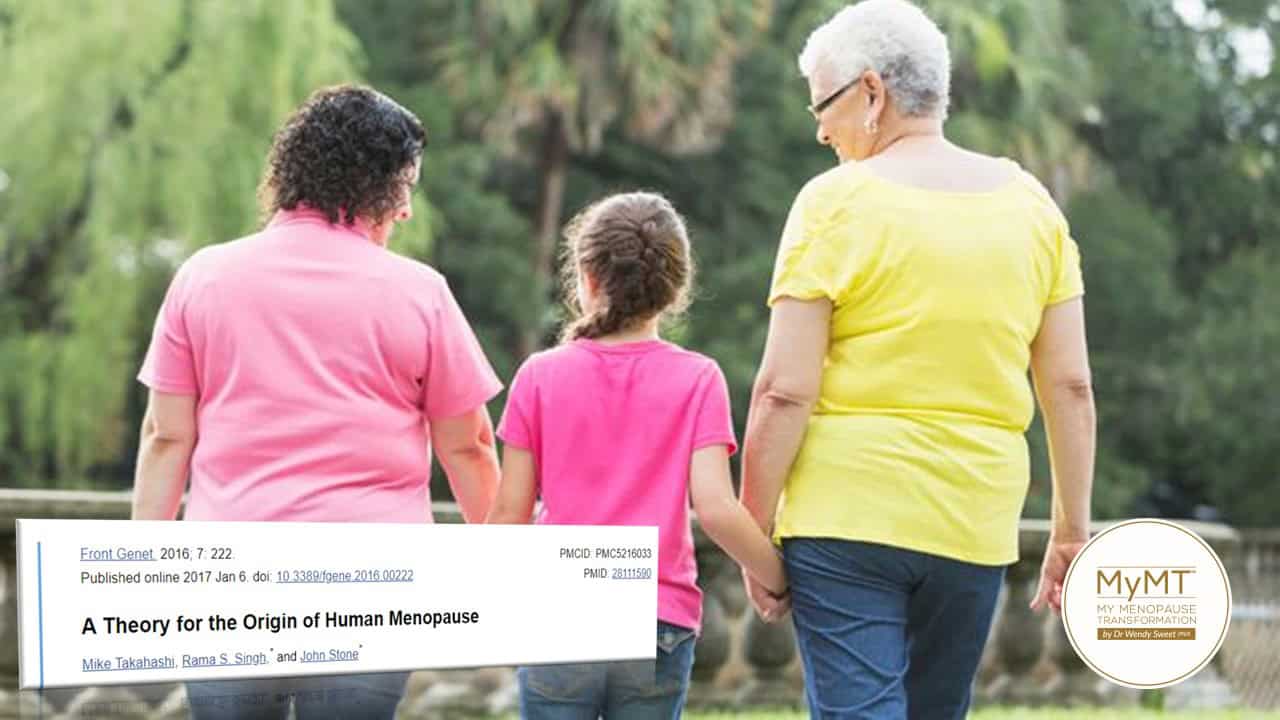
Then there is the theory that childbearing at older ages is relatively risky. There may be little advantage for an older mother in running the increased risk of a further pregnancy when existing offspring depend critically on her survival.
I do tend to agree with this one. Bringing up very young children in our 50’s and trying to cope with not sleeping in menopause doesn’t even bear thinking about!
Why menopause may have evolved has been debated for decades. But researchers do tend to agree on the fact that this stage of life confers some advantages toward survival. Not only for older women, but for daughters and grand-children. They also agree on something else to do with menopause.
The stage of life when reproductive hormone production is reduced, accelerates ageing and advances disease risks due to an increase in inflammatory changes over time. It’s why I always say that “menopause isn’t just about hot flushes” – there is so much more going on in our bodies than we are led to believe.
This is the conclusion I came to as I did my Thesis on women’s health and ageing. Menopause is the biological gateway to ageing. It is the opposite life-stage to puberty. Which is why I’ve situated the My Menopause Transformation courses within ageing research. Or should I say, ‘healthy ageing research’! Not all ageing is healthy. It can be inflammatory. In fact, there is a new term coined by researchers ‘inflammaging.’
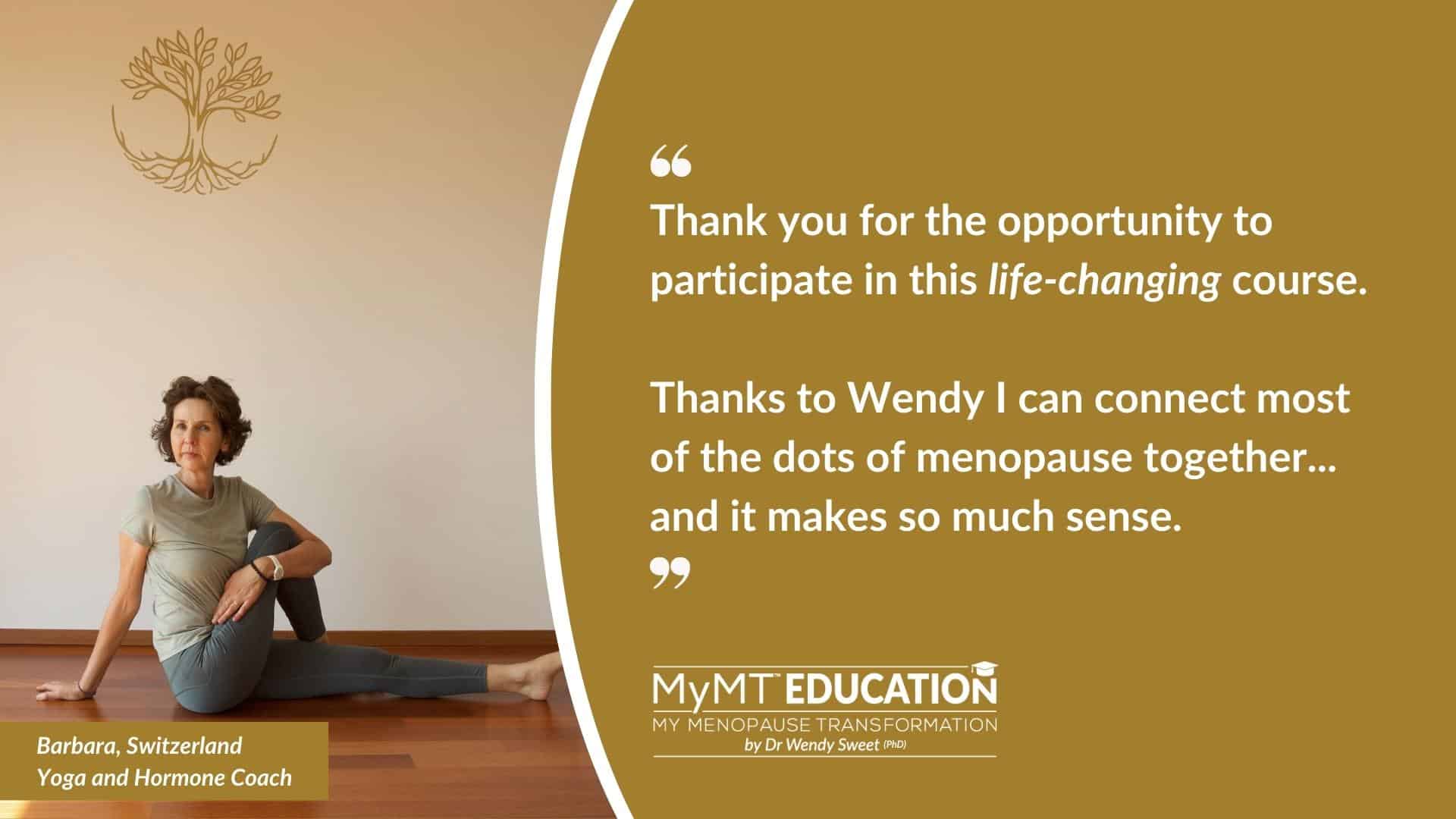
Inflammation in the body makes our symptoms worse.
The term ‘inflammaging’ refers to chronic, low-grade inflammation that characterises ageing. And as I keep reminding women, even though we feel young perhaps compared to our mother’s generation, we must also remember that inside our body, our cells are ageing.
Furthermore, when we aren’t sleeping, we aren’t healing from all the stress that we are under. And I don’t just mean emotional stress. If women are undertaking lots of high-intensity exercise throughout their week (as I used to as well). This can increase physical or oxidative stress inside our cells and tissues when we aren’t sleeping well.
Like over-trained athletes, we then fail to heal properly when we don’t sleep. Inflammation builds up and this begins to affect several tissues and organs, including the gut microbiota and fat cells.
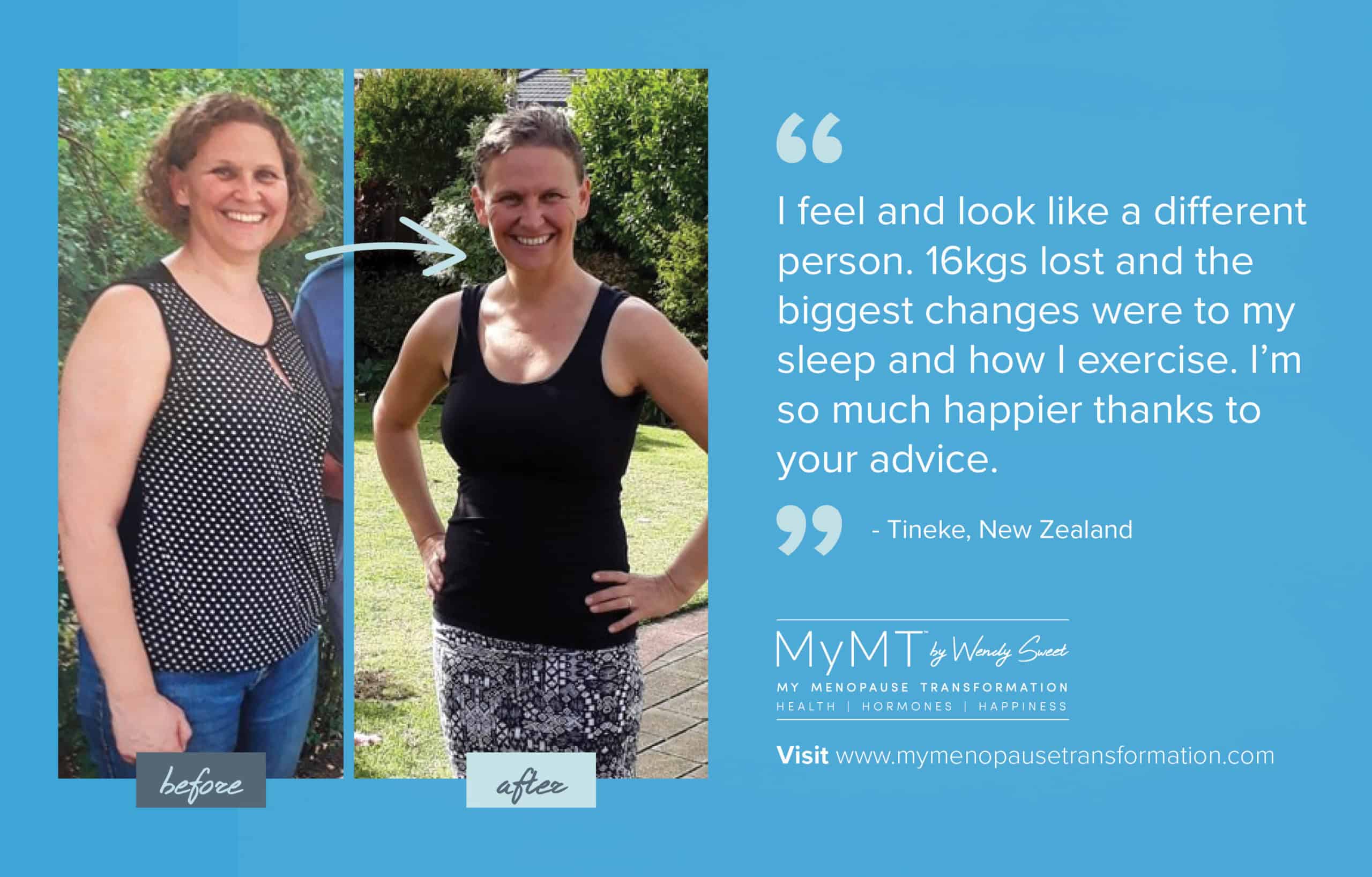
When inflammation is higher than normal, our chronic stress hormone called cortisol, remains higher than it should too.
When cortisol is high in the body, this causes even more inflammation. And I talk about why this is, in my ONLINE Masterclass on Menopause webinar .
In the Masterclass I talk to you about the link between cortisol and our sleep hormone melatonin. If cortisol is high at night, then it interferes with the production and secretion of melatonin. Without enough melatonin being produced during menopause, you toss and turn all night or as many of you have already discovered, you’re awake and watching the clock around 3am. That used to be me as well.
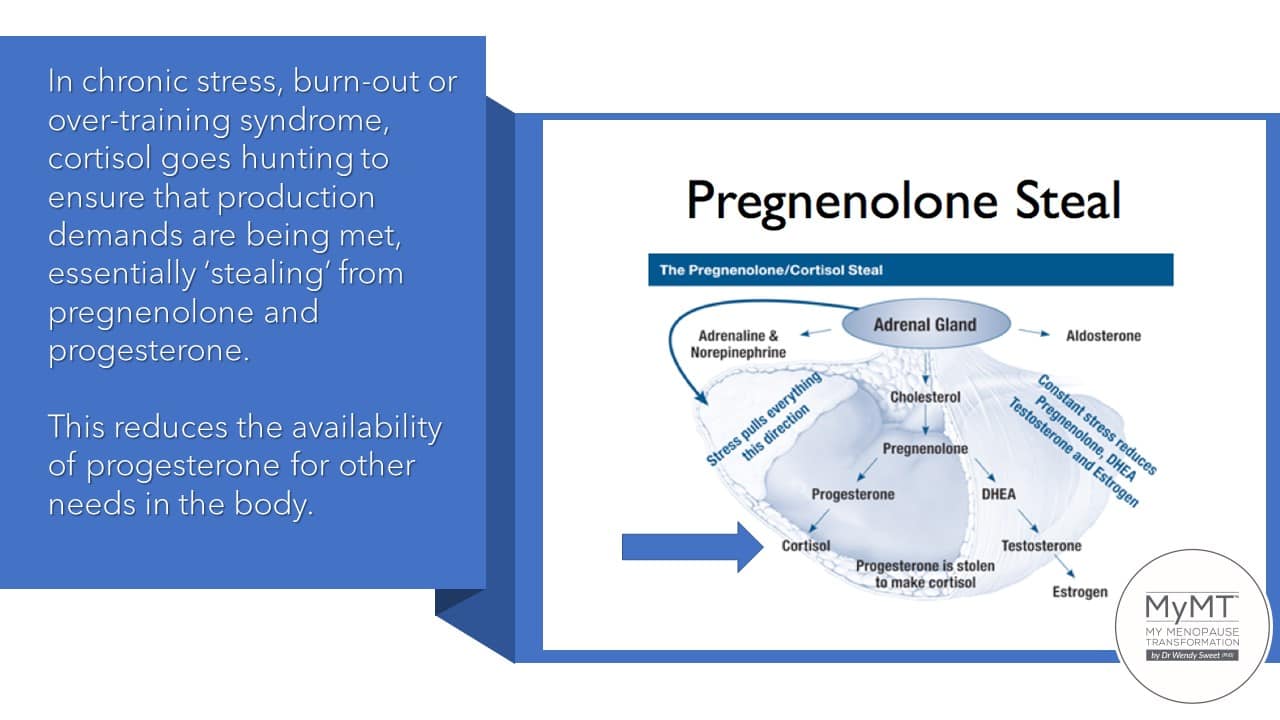
There’s also another anomaly that scientists are learning about menopause and this is, that we weren’t supposed to live as long. In the pre-agriculture, hunter-gatherer period, life expectancy was around 65 yrs or less. Hence, women didn’t have to concern themselves with their ageing.
Today however, we do have to concern ourselves with our ageing.
Many of us have watched our mother’s generation age with all sorts of ailments and functional disabilities. I remember my own mother going on “heart pills’ probably in her late-50’s or early 60’s and complaining about knees and ankles that were continually swollen and sore. A knee replacement helped, but her activity slowed and the weight went on and her health was never the same.
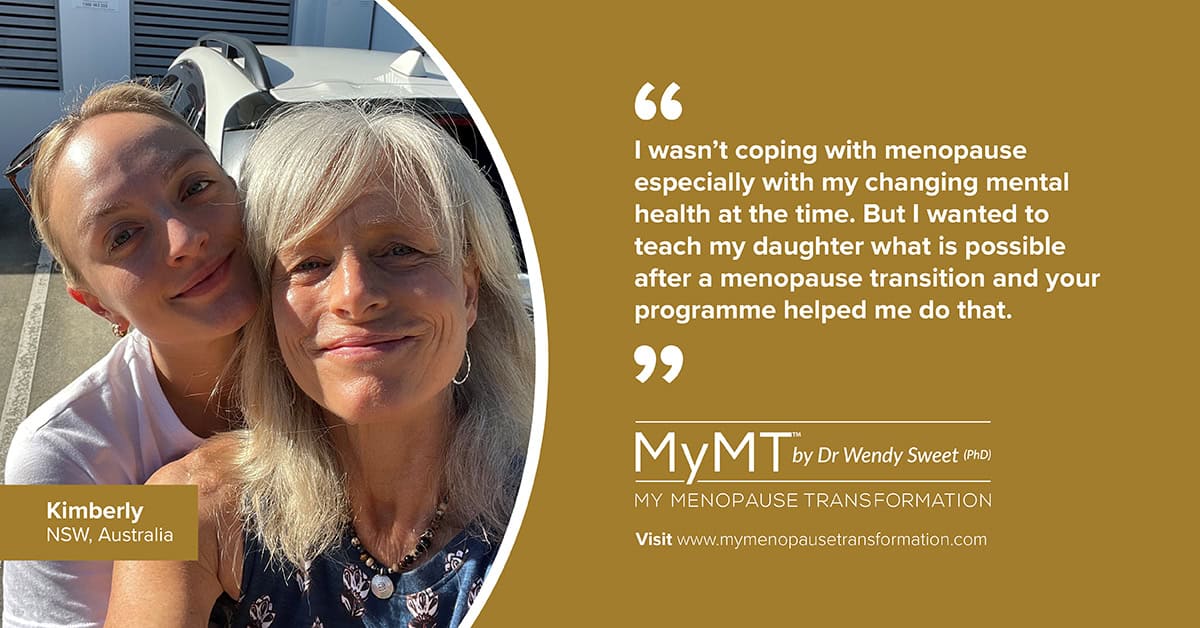
Menopause is derived from the Latin words “meno” which means ‘months’ and “pausia” which means ‘halt’ respectively. But whilst Menopause marks the end of a woman’s period of natural fertility, it doesn’t mean that we can’t feel healthy and happy as we age.
But what this requires is that we turn around our symptoms, especially if we aren’t sleeping or if we are experiencing hot flushes, weight gain, depression and joint pain that is preventing us from staying active.
Paleontologists who study the evolution of menopause report that female hunter-gatherers remain generally active through their late menopause years and are therefore, least likely to be bothered by menopause symptoms. This was evidenced by data on sleep disorders in women from less developed nations as compared with sedentary women in post-industrial countries (Pollycove et al, 2012).
Furthermore, in more recent research, studies into the habits and physical activity patterns of women from the Hadza hunter-gatherer tribe in Africa also found that menopause symptoms (measured as hot flushes) were low and this was partly attributed to the fact that on average, women walked 6km a day.
I talk about this research in my 12 week programmes and health professional courses. It’s an important starting point for women to know ‘how much exercise is enough?’!
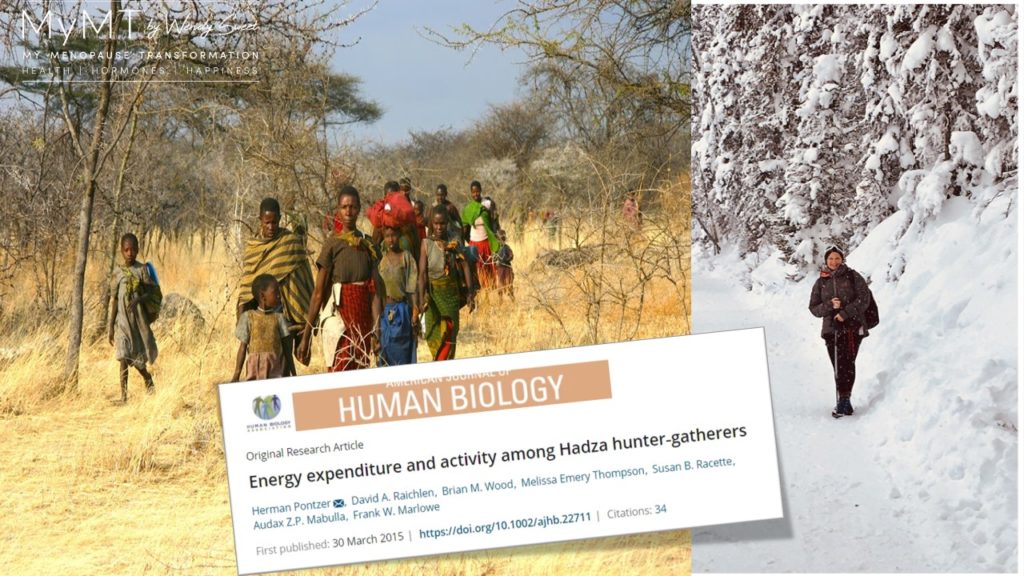
For millions of women around the world, their menopause transition throws them into health and symptom chaos.
But it doesn’t have to be like this at all.
I used to feel so frustrated and despondent until I began to research menopause. When I discovered that it really is the biological gateway to our ageing, and that as we age, we need to understand how to reduce inflammation.
Furthermore, we can’t look at each symptom in isolation, because the body doesn’t work that way. That’s why, when you join a My Menopause Transformation 12-week Programme, the very first module you receive is titled Sleep All Night. It’s that important to rebalance our hormones. From their, we move on to your gut and liver health, so that you can absorb nutrients for your energy and mood. My video explaining the 12-week programmes is below for you.
For those of you who are Health Professionals, in the menopause qualifications, I dive much deeper into the science behind the 12-week programmes, and introduce you to the incredible research about behaviour change strategies specific to midlife women.
If you are a new client, please look at the website page for the Programme of your choice for a welcome discount.
No matter where you are in the world and what is going on in your life, I hope that you can get your symptoms under control, so that you enjoy your menopause years and beyond!
References:
Arbuckle, K. (2016). Why do women go through menopause? Science offers new solution to old puzzle. The Conversation.
Austad S. (1994). Menopause: an evolutionary perspective. Exp Gerontol. 29(3-4):255‐263. doi:10.1016/0531-5565(94)90005-1
Hagg, F. (2020). Evolutionary theories of menopause. Thesis: Linköping University, Sweden.
Pollycove R, Naftolin F, Simon JA. The evolutionary origin and significance of menopause. Menopause. 2011;18(3):336‐342. doi:10.1097/gme.0b013e3181ed957a
Shanley D., Kirkwood T. (2001). Evolution of the human menopause. Bioessays. 23(3):282‐287. doi:10.1002/1521-1878(200103)23:3<282::AID-BIES1038>3.0.CO;2-9
Takahashi, M., Singh, R. S., & Stone, J. (2017). A Theory for the Origin of Human Menopause. Frontiers in genetics, 7, 222. https://doi.org/10.3389/fgene.2016.00222
